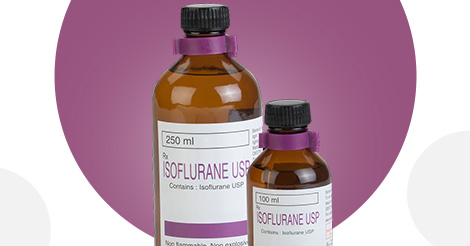Is Isoflurane a Suitable Anaesthetic For You?
Being in pain is rather difficult, but being in extremely unbearable pain is even worse. Humans have always tried to make life easy. Since the prehistoric era, man has used herbal preparations to ease or numb pain.

Today to cause this loss of sensation or numb any pain, anaesthesia is used. It is used mainly when the patient has to undergo surgery, an operation, or any medical procedure that may cause distress and unbearable pain. Anaesthesia eases the procedure and helps the patient to undergo the process without feeling pain or distress.
Anaesthesia usually blocks the signals that pass through your nerves and further to your brain. It helps the patient either sleep or lose any sensations. This prevents pain and discomfort during the medical procedure.
As the effect of the anaesthesia weakens, you start to feel normal sensations again.
The Medicines which cause anaesthesia are called anaesthetics. Anaesthetics are available in two forms; namely local anaesthesia and general anaesthesia. In case of the local anaesthesia, a small area of the body is numbed and the patient remains fully conscious. It is often used during minor procedures or operations. In general anaesthesia, the patient is unconscious and unaware of the procedure. It is often used for more severe and longer medical procedures or operations.
Anaesthetists are doctors who specialise in providing anaesthesia to patients for operations and procedures. Anaesthetics can be administered in many ways, like an ointment (spray or drops), an injection into a vein, and a gas you breathe in. The exact mechanism of action of anaesthetics is not known to date, but it's known that all anaesthetics stop the nerves from passing signals to the brain. This means you do not feel anything. There are many anaesthetics available, and the doctor can select the best among the choices to achieve the desired results.
Isoflurane is one such anaesthetic that can be used by your doctor.
What is Isoflurane?
A general anaesthetic, Isoflurane is indicated for the start and maintenance of anaesthesia. It can be used in adults for paediatric patients for the maintenance of anaesthesia. Isoflurane is inhaled to cause general anaesthesia (loss of consciousness) before and during surgery in adults. In adults and children, Isoflurane can be used as a maintenance anaesthesia after receiving other anaesthetics before and during surgery. Isoflurane is known to reduce sensitivity and relax the muscles. Isoflurane is a liquid that is clear, colourless, and contains no additives or chemical stabilizers. It may have a mildly strong, ethereal odour.
When is Isoflurane used?
Isoflurane is given mainly for inpatient and outpatient surgery. The induction of Isoflurane is often rapid.
It is given to start or induce the anaesthesia and also to maintain the anaesthesia for inpatient and outpatient surgery.
In some cases, other drugs may be used to induce anaesthesia, but Isoflurane is used for maintenance.
Popular brand names for Isoflurane
Isoflurane is sold under the brand names as listed below.
• Forane (Abbott)
• Isotroy (Troikaa Pharmaceuticals)
• Sosrane (Neon Laboratories)
• Isoflurane Usp (Baxter India)
• Isorane (Raman Weil)
• Isifrane (Abbott)
Precautions Before taking Isoflurane
Precautions must be taken before consuming any medicine. All drugs interact with each other and also the food you consume. To be sure that the medicine is safe for you, it is crucial to discuss some matters with your doctor. Let the doctor know if you have any contraindications for general anaesthesia. It is always beneficial to share your entire medical history and family medical history before starting any treatment.
The doctor always weighs the benefits of the medicine and takes into consideration your age and medical condition, before prescribing the required dose.
Before taking Isoflurane, inform your doctor about the following
• Any allergic condition
• Any other medications you are consuming including herbal products
• About Pregnancy or breastfeeding
• If you have asthma or an airway infection
• Heart or blood vessel disease
• Muscle weakness
• Kidney diseases
• Liver diseases
How to take Isoflurane?
Isoflurane is a general anaesthetic, which needs to be taken by inhalation.
It comes as a solution for injection and also in a form where you can inhale it.
Isoflurane is administered from a specific vaporizer that is designed for its use.
A good ventilated area is necessary when using isoflurane.
The minimum alveolar concentration (MAC) of isoflurane decreases with increasing patient age.
The dosage for induction and maintenance is decided by your doctor and is individualized and titrated to get the desired effect.
The dose is as per the patient’s age and clinical status.
During the time when you are under the anaesthesia, your doctor needs to monitor your pulse rate, heartbeat and blood pressure at regular intervals.
Isoflurane can make you sleepy and hence it is advised not to perform any activity that requires concentration for about 24 hours after receiving a dose of Isoflurane.
Side effects
All medicines have side effects. Isoflurane can also cause some unwanted side effects. The side effects tend to fade off after some time, but you need to be alert. If you feel any discomfort, you must contact your doctor.
Common side effects of Isoflurane
• Upset stomach
• Vomiting
• Shivering
Also, if you notice any severe or less common side effects forms like the following condition consult your doctor immediately.
• Hives
• Difficulty Breathing
• Swelling Of Your Face, Lips, Tongue, Or Throat
• Red, Swollen, Blistered, Peeling skin with and without fever
• Wheezing
• Unusual Hoarseness, Confusion
• Weakness, Dizziness, and Light-headedness
• Abnormal or fast Heartbeat
• The bluish Skin colour of the Lips, Nails, Fingers, Toes
• Vomiting
• Fever
• Dark urine
• Tiredness, Loss of Appetite
• Abdominal Pain, Upset stomach
How to know if Isoflurane is the correct anaesthetic for you?
Anaesthesia has been used for a long in medical history to reduce pain and distress in times of surgery or medical operations. Traditionally doctors had a trial-and-error approach to deciding the type and dose of anaesthesia. In most cases, the experience of the doctor played a crucial role. Today with a plethora of options to choose from, it is a task to select the most suited anaesthetic for you.
It is proven that each individual is different due to their genes. It is because of these genes that individuals have a different response to the drugs they take. It is true for anaesthetics too, for some a certain anaesthetic will work wonders, but the same will not be true for another. The dilemma to select the most effective anaesthetic is now solved by the MEDNAWise pharmacogenetic test by Indus Health Plus.
In a new era in personalized medicine,in is affordable and convenient. It is so simple, that you can do it all by yourself at home. All you need to do is, collect your saliva sample and send it for testing. MEDNAWise scans your genes from the sample and tells your body's response to 70+ drugs across various medical specialties. It can tell you if Isoflurane suits you or not. It informs about the effectiveness and adverse reactions of the drugs. You can know the best dosage for you and have quicker treatment solutions. Once the results are out the genetic counsellors help interpret the results and suggest diet plans and the future health plans
MEDNAwise is a single-time test, the results can be reused again anytime when required. Your doctors would readily have information on the exact drugs and dosage beneficial for you to start the treatment. With personalized medicine soon becoming the cornerstone of advanced healthcare, you do not want to miss this train!
After all, a healthy and stress-free life is what we all wish for. To begin your journey on this track to good health call Indus Health Plus and book your MEDNAwise pharmacogenetic test today!
Get In Touch with Our Health Expert
Why Choose Indus Health Plus?


